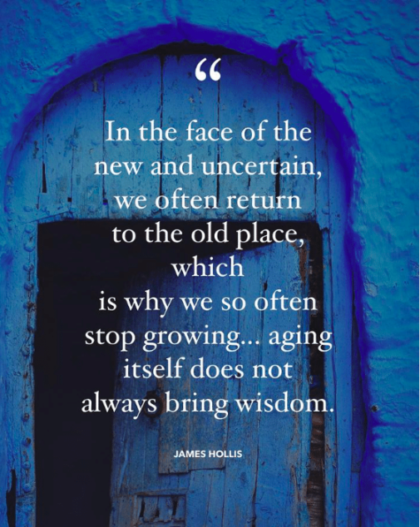Thresholds
thresh·old /ˈTHreSHˌ(h)ōld/:1) a point of entry or beginning
2) the magnitude or intensity that must be exceeded for a certain reaction, phenomenon, result, or condition to occur or be manifested.
3) the point at which you start to experience something, or at which something starts to happen
One cannot live the afternoon of life according to the program of life’s morning; for what was great in the morning will be of little importance in the evening, and what in the morning was true will at evening become a lie.
— C. G. Jung

When I shared with someone that I was facilitating a class on the second half of life, she said, “Just don’t call it the Second Half of Life. No one will come.”
The class sold out.
Four different decades were represented: 40s-70s. I wasn’t surprised we had such an interest, but I was taken back by a waiting list. I called the class Thresholds.
A threshold is a point of entry and an initiation. It’s cumulative life experiences that change your former way of seeing things. All your old ways of making meaning turn to dust.
The Unmentionables
As we gathered in our group, people had a chance to talk about the unmentionables. Unmentionables are existential realities that live in the shadows by day, but come out at 3 AM to remind us of their power over our lives. They drive our avoidances. They drive a culture that loves certainty and distraction.
I’ve learned over the past two decades that when given the chance and the right setting, not only are people courageous enough to discuss cultural taboos and unspokens, they actually long to: they actually feel relief in facing these challenging conversations.
What they don’t have are spaces to talk about it. Sadly, such open spaces for dialogue are few and far between. Thresholds is designed to create spaces for these conversations:
- your shock at the death of a friend, parent, sibling or partner
- cumulative grief and loss
- your encroaching mortality
- pervasive, unexplainable ambivalence in your relationship
- dissatisfaction and disappointment at work
- a “blink of an eye: experience that upended your life
- the countless issues that come from being parents of teen and adult children
- the brevity of time
- an illness or accident
- fear of aging and aloneness
- a sense that the accumulation of your choices, actions and failures to act inhibited your freedom to be who you are
- wondering whether you are living your life or someone else’s
Growing at the Threshold
The cultural directive is to stay comfortable, safe and secure in what we know. We cling to our outdated beliefs. All of us wrestle with resistance to the shock of a destabilizing personal or collective shock. Yet, the more I resist, the more amplifies. especially at night when I’m not working.
There is another way:
Face this threshold.
Irish poet John O’Donohue writes,
You are in this time of the interim
Where everything seems withheld.
The path you took to get here has washed out;
the way forward is still concealed from you.
The old is not old enough to have died away.
The new is still too young to be born.
After the shock and grief subsides I know something new arises out of the practice of facing it with the awareness of a clear mind, the courage of an open heart and the ability to feel the ground beneath our feet.
I’ve seen so many courageous people, regardless of the decade in which they stand, face the threshold and allow it to expose sharp edges, shadows, unfinished business and the humbling realization that we are small in the grand scheme of things.
Our bodies are finite, we will die and so will those we love most. But don’t lose heart.
It’s actually these very conditions needed to weave our fractured selves back to the whole.
